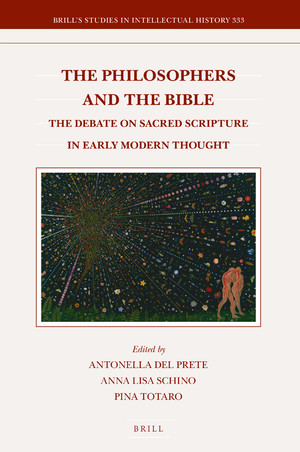Antonella Del Prete /Anna Lisa Schino & Pina Totaro (eds.):
The Philosophers and the Bible
The Debate on Sacred Scripture in Early Modern Thought
Reihe: Brill’s Studies in Intellectual History, Band: 333
Leiden: Brill 2022, XIV, 304 pp., index
E-Book (PDF) ISBN: 978-90-04-47195-5
Festeinband ISBN: 978-90-04-41863-9
The Bible is the crucible within which were forged many of the issues most vital to philosophy during the early modern age. Different conceptions of God, the world, and the human being have been constructed (or deconstructed) in relation to the various approaches and readings of the Holy Scriptures. This book explores several of the ways in which philosophers interpreted and made use of the Bible. It aims to provide a new perspective on the subject beyond the traditional opposition “faith versus science” and to reflect the philosophical ways in which the Sacred Scriptures were approached. Early modern philosophers can thus be seen to have transformed the traditional interpretation of the Bible and emphasized its universal moral message. In doing so, they forged new conceptions about nature, politics, and religion, claiming the freedom of thought and scientific inquiry that were to become the main features of modernity.
Deutsche Erläuterung
Die Bibel ist der Schmelztiegel, in dem viele der für die Philosophie der frühen Neuzeit entscheidenden Fragen herausgearbeitet wurden. Unterschiedliche Auffassungen von Gott, der Welt und dem Menschen wurden im Zusammenhang mit den verschiedenen Ansätzen und Lesarten der Heiligen Schrift konstruiert (oder dekonstruiert). Dieses Buch untersucht einige der Wege, auf denen Philosophen die Bibel interpretierten und nutzten. Ihr Ziel war es, eine neue Perspektive auf das Thema jenseits des traditionellen Gegensatzes „Glaube versus Wissenschaft“ zu eröffnen und die philosophischen Zugänge zur Heiligen Schrift zu reflektieren. Die frühneuzeitlichen Philosophen haben also die bisherige traditionelle Auslegung der Bibel verändert und auch durch ihre exegetischen Arbeiten ihre universelle moralische Botschaft herausgearbeitet und betont. Auf diese Weise schufen sie neue Vorstellungen von Natur, Politik und Religion und forderten die Freiheit des Denkens und der wissenschaftlichen Forschung – gerade auch im Blick auf die Bibel –, die zu den Hauptmerkmalen der Moderne werden sollten.
Contributors include:
Simonetta Bassi, Stefano Brogi, Claudio Buccolini, Simone D’Agostino, Antonella Del Prete, Diego Donna, Matteo Favaretti Camposampiero, Guido Giglioni, Franco Giudice, Sarah Hutton, Giovanni Licata,
Édouard Mehl, Anna Lisa Schino, Luisa Simonutti, Pina Totaro, and Francesco Toto.
Contents / Inhaltsverzeichnis
Front Matter
Preliminary Material Introduction
Antonella Del Prete, Anna Lisa Schino, und Pina Totaro — Seiten: 1–9
Part 1 Enquiring on Moses
Chapter 1 Images of Moses in the Renaissance
Simonetta Bassi — Seiten: 13–31
Chapter 2 More on Spinoza and the Authorship of the Pentateuch
Pina Totaro — Seiten: 32–47
Part 2 Prophet’s Witnessing
Chapter 3 Tommaso Campanella on the Bible
Ontology, Epistemology and Political Philosophy
Guido Giglioni — Seiten: 51–75
Chapter 4 Prophecy and the Prophetic Kingdom of God
in the Hobbesian Analysis of the Holy Scriptures
Anna Lisa Schino — Seiten: 76–90
Chapter 5 Hermeneutics and Conflict
Spinoza and the Downfall of Exegetical Interpretation
Diego Donna — Seiten: 91–101
Part 3 Rational Theology and Natural Religion
Chapter 6 The Bible in the Philosophy
of Anne Conway and Henry More
Sarah Hutton — Seiten: 105–118
Chapter 7 “Between Doubt and Knowledge”
John Biddle and the English Unitarians in the Time of Locke
Luisa Simonutti — Seiten: 119–142
Chapter 8 Immorality and Intolerance in the Bible?
Natural Ethicality and the Interpretation of Scripture
in the Writings of Pierre Bayle
Stefano Brogi — Seiten: 143–157
Part 4 The Moral Message of the Bible
Chapter 9 Peace and Truth in Polemic:
Pascal’s Pensées L974/S771
Simone D’Agostino — Seiten: 161–176
Chapter 10 An Association without Power?
Gift, Recognition, and Democracy
in the Hobbesian Conception of Early Christian Communities
Francesco Toto — Seiten: 177–195
Chapter 11 “The Law Inscribed in the Mind”
On the Meaning of a Biblical Image in Spinoza’s
Theological-Political Treatise
Giovanni Licata — Seiten: 196–214
Part 5 The Accommodation Doctrine
Chapter 12 Firmamentum
La querelle théologico-philologique
du ciel étoilé, de Copernic à Kepler
Édouard Mehl — Seiten: 217–232
Chapter 13 L’exégèse du dernier Mersenne et le cartésianisme
Claudio Buccolini — Seiten: 233–247
Chapter 14 “Accommoder la Théologie à ma façon de philosopher”
Descartes and Dutch Cartesians Interpreting the Bible
Antonella Del Prete — Seiten: 248–261
Chapter 15 Wolff, Spinoza, and the Interpretation of Scripture
Matteo Favaretti Camposampiero — Seiten: 262–277
Chapter 16 Natural Philosophy and Scripture
in Isaac Newton’s Principia mathematica
Franco Giudice — Seiten: 278–291
Back Matter



